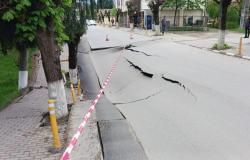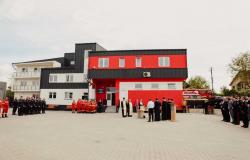
Romania enters Schengen from Sunday, but only with the air and sea borders, under the conditions that Austria does not give in and continues to keep our country at the land border of the European space of free movement. This means that starting from March 31, people traveling to or from destinations in the Schengen member states will no longer have to go through border control in the 17 airports and ports, the representatives of the Ministry of the Interior explaining, on Thursday, what the procedures will be.
Air Schengen – generic imagePhoto: Inquam Photos / Octav Ganea
The Secretary of State in the Ministry of Internal Affairs (MAI) Bogdan Despescu said that there will be no additional obligations for passengers, but only for the authorities.
He explained, on Thursday, in a press conference, what Romania’s accession to Schengen will entail with air and sea borders, presenting the new rules:
- Starting from March 31, 2024, people traveling to or from destinations in the Schengen member states will no longer have to go through border control in the 17 airports and the four seaports located in Constanța county.
- Concretely, after going through the security control procedure at the airport, a current activity in all international airports, including those in the Schengen area, people entering the terminal will not be subject to border control as it is today, at the tonneau.
- Passengers will go directly to the boarding gates and along this route they will be able to be checked by the Border Police and the mixed crews of the Romanian Police, the Gendarmerie and the General Inspectorate for Immigration.
- The counters that now work for both Schengen and non-Schengen will work, starting from Sunday, only on the non-Schengen flow.
- For trips to non-Schengen states, both for Romanian adults and minors, the travel conditions remain unchanged, and the documents will be checked at the Border Police control filters.
Random controls
According to the MAI representative, random checks will be made to detect those who have false travel documents, who are being followed or who are prohibited from leaving the country. If no problems are found during the control procedures, passengers will continue their journey without problems, and if irregularities are discovered, the person in question will be taken to the second line of verification, where the situation will be clarified.
Even the citizens who come to Romania from Schengen will no longer be controlled after disembarking, as is happening now, at the counters. Also in a random way, they can be checked by the Police and Gendarmerie teams.
- “In order to simplify the interaction with citizens and reduce the verification time, at the level of the Ministry of Internal Affairs, the control mechanism was improved by equipping our staff with scanning systems, document verification in a digital form and systems that can be used on the go , mobile.
- If today we talk about these systems only in tones, in counters, from March 31 these devices can be used in the airport parking lot, in the entrance area of the terminal or in the boarding area towards the gates”, said the Secretary of State in the Ministry of the Interior .
According to him, from March 31, the staff at the airports and ports will be supplemented and there will also be teams with dogs to detect drugs.
“This additional force aims to inform, guide, support passengers, as well as detect those who want to take advantage of this facility to leave Romania illegally. At the same time, canine teams specialized in drug detection will act based on analysis activities or based on signals that we still have today”, Despescu also stated.
How many passengers passed through Romanian airports in 2023
In 2023, 23 million passengers passed through Romanian airports.
Over 160,000 flights were registered at Romanian airports last year, 66% of which were Schengen. More than half of the Schengen ones were at Otopeni Airport, followed by Cluj-Napoca Airport, with approximately 3 million passengers, and Iaşi Airport, with approximately two million. Out of the total number of passengers, 300,000 were minors, and in the case of 2,500 of them, the measure of not allowing them to leave the country was taken.
Travel conditions for minors with Air Schengen
Under what conditions will minors be able to travel from March 31?
According to the Border Police, they will no longer carry out border control and will also go directly to the boarding gate. They will not need any additional approval, being able to travel in the Schengen area with the same documents as until now.
The head of the Border Police, Cornel Laurian Stoica, reminded, on Sunday, what documents are required if the child is traveling accompanied by only one parent or another person:
- valid travel document; the consent of the other parent if traveling accompanied by only one of the parents;
- consent of both parents when traveling accompanied by a person other than the parent; only the travel document if he travels to his home/residence and provides proof of this; only the consent of one of the parents when traveling for studies/competitions/medical treatment and proves the declared purpose of the trip.
If the minor is over 16 years old and traveling unaccompanied, he will need: a valid travel document; consent from both parents; only travel document if it provides proof of domicile/residence in the country where you are traveling.
To see if the minors and their companions have the necessary documents, the border police can do random checks in the airport premises.
- “If it is found that they are not in their possession, they will not be allowed to leave the country. Accompanying minors, other than the parents or the legal representative, are no longer required to present the criminal record certificate in physical format. It is consulted electronically by the border policeman.
- However, if the border policeman finds that the minor’s companion has committed certain crimes provided for by law, he will not be allowed to leave the country with the minor. It is about the following crimes: murder; crimes against sexual freedom and integrity; crimes related to the trafficking and exploitation of vulnerable persons; unlawful deprivation of liberty; crimes related to drug trafficking or precursors; trafficking in human tissues or organs; crimes of terrorism”, stated the general inspector of the Border Police.
“Anything else is counterproductive”
At the land borders, however, controls will continue to exist after March 31, because Austria continues to oppose Romania’s full accession to Schengen.
On March 5, the Austrian Minister of the Interior, Gerhard Karner, insisted that he must first see how the entry of Romania and Bulgaria into Schengen with the air and sea borders will proceed from March 31, and only then will he think about the next step, access with land borders: “Anything else is counterproductive.”
Present, at the meeting of the ministers of interior and justice of the EU, Gerhard Karner was asked by journalists whether in the near future something will change in Austria’s position regarding the full entry into Schengen of Romania and Bulgaria, including with the land borders, transmits News.ro.
“We had a very open and intense dialogue at the beginning of the year and we reached a compromise that will enter into force at the end of this month, more precisely at the end of March, the so-called Maritime Schengen and Air Schengen,” said Gerhard Kerner, referring to the agreement reached for Romania and Bulgaria to enter Schengen with air and sea borders starting from the end of March.
At the same time, the Austrian interior minister suggested that Vienna is in no hurry to make a decision regarding land borders, preferring to see how this partial Schengen works and then “think about it”.
“Let’s first implement this compromise”
“I think it’s very important that we implement this compromise first, take this step and think about the next step after that,” Karner told journalists in Brussels who had raised the issue of Austrian companies’ grievances because the “blockade” at the borders with Bulgaria and Romania makes it difficult for them to do business.
“Anything else is counterproductive,” countered Gerhard Karner. “I think it is wrong to speculate about the next step before the first step has been taken,” the Austrian interior minister pointed out. “We should see how it works (compromise – no) and then the next steps are possible.
Taking the second or even third step before the first is completely wrong and counterproductive, and sometimes leads to people not being satisfied with how the mechanism works,” Karner insisted.





